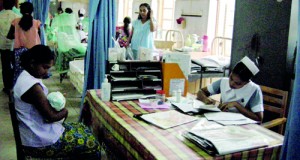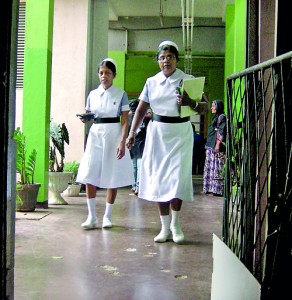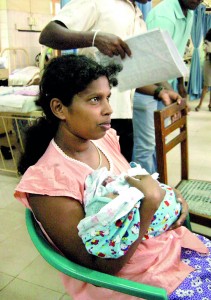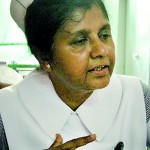News
Bedlam at Ragama Hospital
Last Wednesday the Ragama Teaching Hospital looked calm and peaceful with the usual hustle and bustle of patients being wheeled in and doctors rushing into surgery. Only two days before, on Monday, the hospital was almost brought to a standstill by violent clashes between nurses and midwives.

Calm after the storm: Maternity ward at the hospital. Pix by Athula Devapriya
On Wednesday maternity wards 17, 18 and 25, ground zero for the confrontation, were functioning as always with mothers and their crying newborns hastily attended to by midwives and nurses. However, the two parties, despite their symbiotic relationship in providing maternal and child care services, are no longer on speaking terms with each other.
“They are of course doing their work now,” Ragama Hospital Director Mahinda Samarasinge told the Sunday Times, as he busily signed away three days collection of paperwork. “The hospital now is fairly okay. Hospital administration and officials from the Ministry of Health held discussions with the nursing staff and midwives and they agreed to put off the strike. The nurses requested full police security for themselves.”
“Don’t try to create another problem, you just say the hospital is open, everyone is friendly, nicely working,” a very tense-looking Dr. Samarasinge added just as two officials from the Health Ministry entered, sent there to conduct a formal inquiry into the clashes that happened on Monday.
Tensions arose between nurses and midwives at Ragama over signing of a duty register. Midwives report their daily attendance by

It was back to daily routine by Wednesday
signing a duty register maintained by a senior nurse. Midwives want their own, separate duty register to be maintained by a senior midwife, and as demanded by the unions they began keeping their own duty register since last month.
Since earlier this year, nurses have been striking against a separate duty register for midwives. When midwives began to sign their own duty register nurses’ trade unions retaliated by barring any midwife who hadn’t signed the duty register, maintained by nurses, from entering maternity wards and delivery rooms.
The union action escalated into a full-blown clash last Monday at Ragama, with daily media reporting a “war zone”-like situation at the hospital with midwives, nurses and support staff “exchanging blows,” “throwing bottles,” “pushing,” “biting,” “tripping over” each other and even a case of strangling.
The nurses, midwives, hospital support staff and police involved insisted that the media has “exaggerated” the situation, blowing it out of proportion, and that no one at the hospital had actually “exchanged blows.” The truth depends on who is telling the story.
The union action began on June 26, Thursday, with nurses barring morning shift midwives from entering the three maternity wards.
“The midwives stubbornly forced in a new register,” Senior Nurse T. Wijesundara said. “A separate register is problematic because, in maternity wards there are two lives at stake, the mother’s and the child’s, so when midwives sign a non-legitimate separate register, they are exempt from responsibility for these lives. I don’t know what they sign; I’ve never even seen it. If something goes wrong

Shanika Ayanthi: Was undergoing labour pains during incident on Monday
during a delivery, they can easily say ‘I wasn’t there.’ We tried telling them nicely, they didn’t accept, so we decided on union action.”
“We had off-duty nurses from other wards guard the entrance to the maternity wards,” Nadeera Ranasinge, another senior nurse present during the clashes, said. “There were about eight of us guarding Ward 17 gate, and I don’t know what forces were at work but an army of about 200 hospital support staff came rushing and started yelling at us using expletives.”
“So we closed the gate,” she added. “But they then tried to force themselves through by jumping over it. Then they broke the gate open and barged in overturning the chairs and tables in the room. There were Sisters caught in the crowd, one was pushed against a cupboard and another said someone squeezed her neck.”

Senior Nurse T. Wijesundara
“It was done very systematically,” Sister Wijesundara said. “One nurse was assaulted and another was bitten by a midwife. When the media arrived some played victim for the cameras. Some of them said we starved them, but we have photographic proof to show that they were eating. We have taken the Nightingale oath so we don’t need to lie. This is what really happened.”
The midwives said the nurses didn’t detain anyone against their will, but because they wouldn’t let the morning shift midwives inside, the night shift midwives couldn’t leave.
“When we end our shift we have to hand over our duties to the midwife taking over,” Senior Midwife Renuka Jayalath said. “That means giving patient information to the incoming midwife, handing over equipment, among other things. Without doing that we can’t leave our shift. So when the nurses wouldn’t let anyone in, the three night shift midwives couldn’t leave their posts.”
“During that time we didn’t get anything to eat, only had tap water to drink, and had to pee in a bucket,” Kanthi Samaranayaka, one of the midwives stuck inside on Monday said. “Then on Sunday a ministry official got us food. But nurses would then squeeze those food packets until they weren’t fit to eat.”“Because the nurses were here, in other wards doctors were taking care of patients all by themselves,” Mallika Soorasinghe, another midwife present, said. “Nurses left operating theatres while patients were under anesthesia and doctors either had to postpone surgeries or do it by themselves. That was the real situation.”
Dr. Samarasinghe said hospital operations “collapsed” for “about five hours, maybe” during the incident. At least one pregnant woman had to be transferred for a cesarean. A medical intern who was present during the incident said there were “brief issues,” but “patient care wasn’t disrupted.”
Shanika Ayanthi, a patient who was undergoing labour pains during the incident on Monday said the “missies” assured expectant mothers “not to be afraid, there was union action taking place, but they will take care of us,” adding that “they looked after me really well.”

Kanthi Samaranayaka: One of the midwives stuck inside on Monday
A police officer who was present during the clashes said no one was seriously injured, “there was no huge fight.”
“No one was unlawfully detained,” the police officer said. “There was some verbal sparring and a lot of pushing that caused some minor injuries. Those who claim to be seriously injured don’t actually have Judicial Medical Officer (JMO) reports to back up their claims. One claimed she was strangled, that claim couldn’t be substantiated. Another said she was bitten, but there were no bite marks and when I tried to inspect the supposed injury by touching it, there wasn’t even an ‘ouch.’”
Dr. Samarasinge said the duty registry issue at Ragama Hospital isn’t solved but the parties involved had come to a temporary agreement to keep the hospital functioning until the Ministry officials come to a permanent decision on the 10th of this month.
The nurses’ unions blamed the Government Medical Officers’ Association (GMOA) for “creating” a problem with midwives and nurses.
“The GMOA is creating problems trying to break up the current administrative system,” Government Nursing Officers’ Association (GNOA) president Saman Rathnapriya said. “The Health Ministry Secretary issued a circular on the 18th of last month requesting the administrative system be maintained as it is. At Ragama, this is not done. Midwives aren’t trained to manage, so they can’t supervise. When there are two systems in the labour room it ultimately creates a conflict.”
“The doctors are the team leaders, all other staff—nurses, midwives, etc.,—are assisting personnel,” GMOA officer Dr. Chandika Epitakaduwa said. “Ultimately, the full accountability for a patient falls on the doctor, not on anyone else. The GMOA believes nurses and midwives are from different disciplines. So they should be treated as different categories, one cannot be kept under another.”
The midwives’ unions say they want a separate duty register because the nurses constantly mistreat them. For example, if five midwives are wanted for a task, the supervising nurse would send one midwife and four nurses, and the midwife would be asked to perform minor tasks not related to her main duties.
“If a midwife is late because of, say, her train was delayed, then the supervising nurse still records her name below the red line,” a midwife said. “But if a nurse is late, her name is always recorded above the red line.”
Ragama is the latest hospital where this problem arose, previous clashes haing occurred at hospitals in Kurunegala and Peradeniya.
A Health Ministry official who wished to remain annonymous said the clashes between midwives and nurses arecontributed to by a salary disparity between the parties.
“Until about five years ago, a certain percentage of midwives could come into nursing, now the Ministry has stopped that,” the official said. “Midwives are trained for a year and a half, nurses are trained for three years but despite that, in some places the midwives are paid more because the Ministry messed up structuring their salaries. Midwives can be promoted to first grade in 12 years but for nurses it takes 17 to 20 years. These are long standing issues the Ministry has failed to solve, so these eventually contribute to the escalation of the situation.”
Meanwhile, other hospital workers at Ragama cautioned that trade unions should consider the welfare of the patients first.
“While one protects one’s occupation, one should also respect others’ occupations as well,” Wasantha Kumara Wijesinghe, hospital worker and organiser for Gampaha District Health Workers’ Union, said. “These problems cannot be solved in an aggressive manner.”
Neither Health Ministry Secretary Sudharma Karunaratne nor Health Services Director General Palitha Mahipala was available for comment. Multiple calls to Ministry officials requesting comments were not returned.

